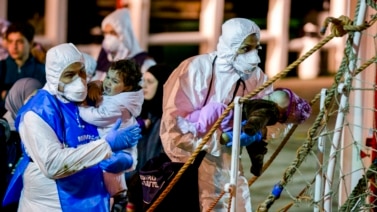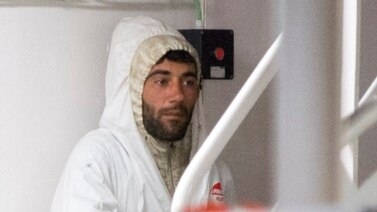Hundreds of thousands of people have fled the civil war in Syria. Many of them sail to Europe across the Mediterranean Sea. The trip is frightening, with danger everywhere.
Hundreds of asylum seekers have set sail from the Libyan coast. They depend on an old fishing boat to take them to Europe.
Among these migrants are six young men from Syria: four brothers and two friends. They have fled the civil war. They record details of the trip on their mobile phones.
In front of the boat lies 2.5 million square kilometers of the Mediterranean Sea.
The seas are calm for the first 15 hours of the trip. Then two ships appear. It is the Italian coast guard. The boat’s passengers are happy. Some begin shouting, “Italia!”
The migrants are taken to the island of Lampedusa, and then on to Sicily, where they are let free. They take the first night train north to the city of Milan.
It is in Milan that reporter Henry Ridgwell first meets the six Syrians. They seem nervous, tired and fearful. The oldest brother, Ghiyath, describes their trip.
“We escaped to Jordan, and from there to Algeria. Then we went illegally to Libya. It took five days to cross the desert. It was very hard, five days close to death. We got to Tripoli and from there to Sabratah. We had a lot of trouble there because the trafficker stole from us. Then we escaped and took the boat to Lampedusa.”
Ghiyath says the trip across the Mediterranean was more frightening than the war back at home.
“It was a death trip. Your mind stops thinking. You stop thinking about anybody and anything, even about yourself. You’re just living minute by minute on this hard journey. It’s a very strange feeling.”
The young men are on their way to Germany on the night train. The brothers’ father is already in Berlin, their final stop. Their mother is still in Syria. Younger brother Elaa explains why they left.
“We have lost our future in Syria and we hope to find it in Germany, for now."
With minutes to go, the six migrants get their few belongings and go to the train station. Under European laws, refugees must ask for asylum in the country where they first arrive. Police sometimes search train carriages and send the migrants back to Italy. The brothers’ future will be decided on this train.
For two days, there is no news. Then VOA receives a message: the brothers have reached Munich.
After a night in a refugee shelter, they are on their way to Berlin. Reporter Ridgwell meets with the Syrians briefly before a high-speed train takes them on the last part of their trip north. Ghiyath is thankful and happy.
“I can’t wait to see my father again after six years apart. I hope that I can see my mother again soon and we can be one family all together.”
There is much sadness in Europe’s migrant crisis. Solving the problem will not be easy. But at least for these brothers, the escape from war across desert and sea has a happy ending.
I’m Caty Weaver.
Correspondent Henry Ridgwell reported this story from Munich. George Grow adapted it for Learning English. Caty Weaver was the editor.
Words in this Story
migrant – n. someone who goes from one place to another, often to find work
mobile phone – n. a small telephone that people can take with them and use outside their homes; a wireless telephone; a cell phone
journey – n. trip or travels


